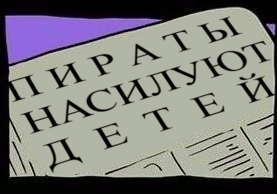Intellectual property infringement is rape
 Piracy is a hot topic lately. There are people who believe that this is good, there are
Piracy is a hot topic lately. There are people who believe that this is good, there are Piracy is the rape and murder of two or more women who have not reached the age of (children !!), knowingly for the perpetrator who are in pregnancy, committed with particular cruelty in a generally dangerous way by a group of persons, a group of persons by prior agreement or an organized group on the motive of a national, racial, religious hatred or enmity, or based on hatred or enmity against any social group.
The most ordinary. We all understand how serious and terrible a crime is, so why do many countries turn a blind eye to intelligent pirates and allow them to kill our women, children, old people, ruin our health and education, sabotage and hack off the chance for a happy existence of our nation?
Once again I will pay attention, this article does not claim that Infringement of copyright and related rights is good or bad. She only argues that calling piracy is not theft.
Turn to the wiki
Theft (art. 158 of the Criminal Code of the Russian Federation) is the secret theft of another’s property .
Property - a set of things that are owned by any individual, legal entity or public law education (including money and securities), as well as their property rights to receive things or property satisfaction from other persons.
Objects in the civil law are recognized as objects of the material world that are of value to a person, able to satisfy the needs of subjects of civil legal relations, to be the subject of goods exchange.
')
That is, you can only steal the subject of the material world, which copyright is not.
But you can call Wikipedia an "unauthorized source." Let us then turn to the "Criminal Code of the Russian Federation." Is this an authoritative source?
Criminal Code of the Russian Federation
Piracy
Piracy, or “Infringement of Copyright and Related Rights” refers to Chapter 19, “ Offenses against the constitutional rights and freedoms of man and citizen, ” namely Article 146 of the Criminal Code of the Russian Federation Violation of Copyright and Related Rights
Theft
Theft, or theft, refers to Chapter 21, “ Crimes against property ” of the Criminal Code, namely Article 158 of the Criminal Code of the Russian Federation Theft
Rape
Rape relates to Chapter 18, " Crimes against sexual integrity and sexual freedom of the individual, " namely Article 131 of the Criminal Code of the Russian Federation Rape
Murder
Murder refers to Chapter 16, " Crimes against life and health, " namely Article 105 of the Criminal Code of the Russian Federation Murder
Conclusion
Theft is as much piracy as murder with rape. These are not only different articles, but they are even different chapters of the Criminal Code of the Russian Federation. And the statement “When you download illegal content, you steal” as truthfully as “When you download illegal content, you force, kill, trade people, engage in terrorism and extremism and everything else ...”
Moreover, calling a person who may have violated copyright and is possibly guilty (and even if proven) under article 146 of the Criminal Code of the Russian Federation Violating copyright and related rights as a thief is a gross violation of the criminal code, Chapter 17. Crimes against freedom, honor and dignity personality , Article 129 of the Criminal Code (Criminal Code) of the Russian Federation Libel . But many ignore this fact .
Source: https://habr.com/ru/post/109968/
All Articles